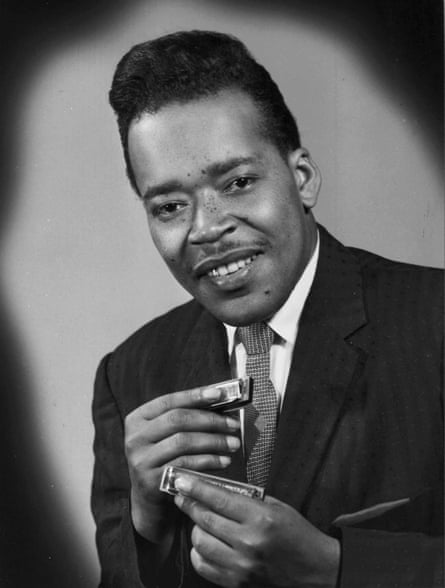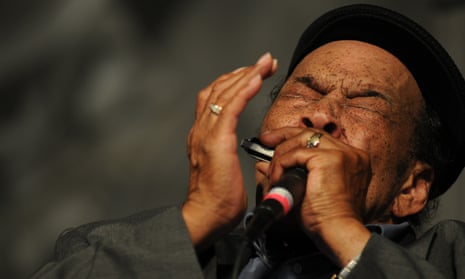A small group of musicians working in Chicago in the 1950s and 60s created modern blues harmonica-playing, among them Little Walter, Sonny Boy Williamson II, Walter Horton and Junior Wells. James Cotton, who has died aged 81, was the last of that company, but he probably travelled more widely, and was heard by more people, than any of them. In a career spanning six decades he played at all the major blues and rock festivals, made more than two dozen albums and gathered armfuls of awards.
His first recordings under his own name, for Sun Records in 1953-54, presented him as a singer, notably in a commentary on farming conditions neatly titled Cotton Crop Blues, but not long afterwards he took over the harmonica role in Muddy Waters’ band, an association that would last more than a decade. In the mid-60s he emerged as a bandleader in his own right, contributing to Sam Charters’ Chicago/The Blues/Today! project (1966) and forming the James Cotton band, which, with guitarists including Luther Tucker and Matt “Guitar” Murphy, was one of the most exciting and forceful groups on the blues circuit.
In the late 70s he returned to his place in the Muddy Waters band for the album Hard Again (1977) and its successors, produced by Johnny Winter, which restored Waters’ flagging fortunes.
Cotton’s own career was boosted in the 80s by albums for Alligator Records, and in the 90s for Verve. His voice had been sapped by throat cancer, but what was left he used to moving effect on the 1995 acoustic quartet album Deep in the Blues, and it earned him a Grammy. He also recorded for Telarc and, again, Alligator, for whom he cut his last album, Cotton Mouth Man, in 2013.
Cotton was the son of Hattie and Mose, sharecroppers on a cotton plantation in Tunica, Mississippi; both his parents died while he was still a boy. He hung out with older musicians such as Williamson, who became a kind of musical guardian, and Howlin’ Wolf, whom he accompanied on recordings in 1952. Like them, he moved north to Chicago, after succeeding Little Walter and Junior Wells in the Waters band. It was a dream job, but a frustrating one, since Muddy wanted him to play Little Walter’s solos from their earlier records together. “I finally had to tell him,” Cotton said later, “‘I will never be Little Walter. You’ve just got to give me a chance to be myself.’”

In 1960 the band appeared at the Newport folk festival, an engagement that was recorded and issued on LP later that year as Muddy Waters at Newport and included a song the band had just added to their repertoire, Got My Mojo Working. The number immediately caught on with blues enthusiasts in the UK such as Alexis Korner and Long John Baldry, who would include it on the LP R&B From the Marquee in 1962, with Cotton’s harmonica part taken on by Cyril Davies. In 1961 Cotton was invited to the UK by the bandleader Chris Barber.
Like his close contemporary Wells, Cotton was not a prolific songwriter, preferring to reinterpret blues standards of his day such as Black Night or River’s Invitation, or to recreate, very skilfully, the sound of his own past recordings with Waters. But he was perhaps at his best when driving the high octane music of a busy, noisy band with his immensely powerful harmonica playing.
In the last decade or so, though his voice had practically disappeared, his playing was scarcely diminished. He engaged in projects including his 35th Anniversary Jam in 2001, attended by friends and admirers such as Koko Taylor, Bobby Rush and Shemekia Copeland. The occasion was caught on record: Cotton’s blowing was as hard-hitting and deep-dyed blue as always, and, despite all the participants, there was never any doubt whose album it was. Some of the same friends came out to honour him at a concert at Lincoln Center, New York, in 2010.
He is survived by his wife, Jacklyn, two daughters and a son.

Comments (…)
Sign in or create your Guardian account to join the discussion